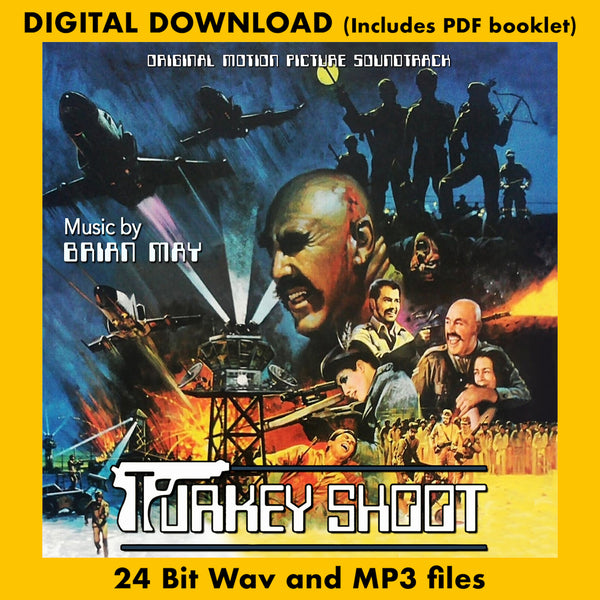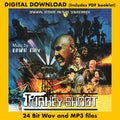
Release Date:
Downloads include choice of MP3, WAV, or FLAC
DDRDG712
Includes Digital Booklet
Click Here for CD Release
Dragon’s Domain Records presents TURKEY SHOOT, featuring music composed by Brian May (MAD MAX, THE ROAD WARRIOR, CLOAK & DAGGER) for the 1982 science fiction horror film directed by Brian Trenchard-Smith (THE MAN FROM HONG KONG, STUNT ROCK, THE SIEGE OF FIREBASE GLORIA, SAHARA), produced by Antony I. Ginnane and William Fayman, John Daly, David Hemmings and Brian W. Cook during the boom of the Australian New Wave of cinema in the late 1970s and early 1980s from a screenplay written by Neill Hicks and Jon George, starring Steve Railsback, Olivia Hussey, Lynda Stoner and Michael Craig.
Released in 1982, TURKEY SHOOT, also known as ESCAPE 2000, takes place in a dystopian future where society is falling apart. Violent riots are shredding cities to pieces. Free will is extinct and defunct and the free exchange of ideas is a mere fantasy. Those who try to resist the current government are herded into ‘re-education’ camps and forced to literally run for their lives to be hunted by the guards and special guests for sport. If they can survive the hunt, they can return to society.
Created during a period of brazen musical fearlessness in cinema, May’s score for TURKEY SHOOT is an unique blend of various acoustic and electronic textures that were wildly audacious for their time. The orchestral passages were comprised of oppressively heavy marches and savagely bleating brass while his synthesized concoctions pushed the boundaries of early 1980s genre scoring.
Born in Adelaide in 1934, Brian May (no relation to Brian Harold May of Queen) was one of the first composers to achieve international acclaim as an Australian composer and was best known as the composer of MAD MAX and THE ROAD WARRIOR (MAD MAX II). May received his musical training as a pianist, violinist and conductor at the Adelaide Elder Conservatorium. He joined the Australia Broadcasting Company in 1957, where he formed the ABC Adelaide Big Band, an ensemble that performed all manner of light music for broadcast, and May became a leading figure in Australian light music as a result. He moved to Melbourne in 1970 to arrange and conduct the ABC’s Melbourne Show band. Moving into film music in a period of time when Australia’s film industry was just beginning to take its place among international film circles, May composed such notable film scores as RACE FOR THE YANKEE ZEPHYR, ROAD GAMES, CLOAK AND DAGGER, DEATH BEFORE DISHONOR, MISSING IN ACTION 2, SKY PIRATES, STEEL DAWN, DR. GIGGLES, FREDDY’S DEAD: THE FINAL NIGHT MARE and BLINDSIDE. He won the Australian Film Institute Award for best original score with MAD MAX; many other awards followed, including the Golden Award from the Australian Performing Rights Association. He continued to score films until 1993, composing music for more than 30 films and many hours of television, most of which he orchestrated himself. Sadly, the composer passed away in 1997 at the age of 63.
Previously released on a very rare compact disc release, Dragon’s Domain Records is excited to bring the TURKEY SHOOT back to the marketplace, newly remastered by James Nelson at Digital Outland with much improved sound. The booklet includes liner notes written by author and composer Brian Satterwhite, including the participation of director Brian Trenchard-Smith.
Turkey Shoot (1982) ***
BRIAN MAY
Dragon’s Domain DDR712
14 tracks - 47:11
Turkey Shoot (aka Escape 2000), an early film in the oeuvre of English-Australian director Brian Trenchard-Smith (Deathcheaters), comes from Australian cinema’s fruitful period of dystopian sci-fi films spurred on by the success of 1979’s Mad Max. Sort of updated take on The Most Dangerous Game, the story sees two wrongfully-accused prisoners escape and attempt to evade recapture. Composer Brian May practically defined the gritty sound of this subgenre, and this score followed shortly on the heels of his seminal work on Mad Max 2 (aka The Road Warrior).
Turkey Shoot was briefly available on a hard-to-find CD, but Dragon’s Domain now makes the album easily accessible (limited to 500 units, but also available as a download), while re-editing and remastering the score. Additionally, a series of brief cues have been stitched together into longer stretches, and there is some music not found on the earlier release. The score itself is noted for its then state-of-the-art approaches to electronics, countered by big orchestral passages.
The timpani-driven “Opening Theme” may seem unorthodox, but is effective and memorable. The aforementioned electronic material can be both trippy and intense in tracks like “Jungle Pursuit” and “Compound Music,” the latter which feels like it owes something to the folks at the BBC Radiophonic Workshop. By contrast, some of the score’s large-scale acoustic writing features interesting thematic ideas with syncopated rhythms driving the action, as in “At the Camp” and “Breakout.” This dichotomy makes for an intense album experience.
While the experimental aspects of the electronics may put off some listeners, those familiar with May’s work will certainly want to snatch this one up. —Steven A. Kennedy
Comments regarding this review can be sent to: stev4uth@hotmail.com.
TURKEY SHOOT - Original Soundtrack by Brian May
Brian May
$8.95
Downloads include choice of MP3, WAV, or FLAC
DDRDG712
Includes Digital Booklet
Click Here for CD Release
Dragon’s Domain Records presents TURKEY SHOOT, featuring music composed by Brian May (MAD MAX, THE ROAD WARRIOR, CLOAK & DAGGER) for the 1982 science fiction horror film directed by Brian Trenchard-Smith (THE MAN FROM HONG KONG, STUNT ROCK, THE SIEGE OF FIREBASE GLORIA, SAHARA), produced by Antony I. Ginnane and William Fayman, John Daly, David Hemmings and Brian W. Cook during the boom of the Australian New Wave of cinema in the late 1970s and early 1980s from a screenplay written by Neill Hicks and Jon George, starring Steve Railsback, Olivia Hussey, Lynda Stoner and Michael Craig.
Released in 1982, TURKEY SHOOT, also known as ESCAPE 2000, takes place in a dystopian future where society is falling apart. Violent riots are shredding cities to pieces. Free will is extinct and defunct and the free exchange of ideas is a mere fantasy. Those who try to resist the current government are herded into ‘re-education’ camps and forced to literally run for their lives to be hunted by the guards and special guests for sport. If they can survive the hunt, they can return to society.
Created during a period of brazen musical fearlessness in cinema, May’s score for TURKEY SHOOT is an unique blend of various acoustic and electronic textures that were wildly audacious for their time. The orchestral passages were comprised of oppressively heavy marches and savagely bleating brass while his synthesized concoctions pushed the boundaries of early 1980s genre scoring.
Born in Adelaide in 1934, Brian May (no relation to Brian Harold May of Queen) was one of the first composers to achieve international acclaim as an Australian composer and was best known as the composer of MAD MAX and THE ROAD WARRIOR (MAD MAX II). May received his musical training as a pianist, violinist and conductor at the Adelaide Elder Conservatorium. He joined the Australia Broadcasting Company in 1957, where he formed the ABC Adelaide Big Band, an ensemble that performed all manner of light music for broadcast, and May became a leading figure in Australian light music as a result. He moved to Melbourne in 1970 to arrange and conduct the ABC’s Melbourne Show band. Moving into film music in a period of time when Australia’s film industry was just beginning to take its place among international film circles, May composed such notable film scores as RACE FOR THE YANKEE ZEPHYR, ROAD GAMES, CLOAK AND DAGGER, DEATH BEFORE DISHONOR, MISSING IN ACTION 2, SKY PIRATES, STEEL DAWN, DR. GIGGLES, FREDDY’S DEAD: THE FINAL NIGHT MARE and BLINDSIDE. He won the Australian Film Institute Award for best original score with MAD MAX; many other awards followed, including the Golden Award from the Australian Performing Rights Association. He continued to score films until 1993, composing music for more than 30 films and many hours of television, most of which he orchestrated himself. Sadly, the composer passed away in 1997 at the age of 63.
Previously released on a very rare compact disc release, Dragon’s Domain Records is excited to bring the TURKEY SHOOT back to the marketplace, newly remastered by James Nelson at Digital Outland with much improved sound. The booklet includes liner notes written by author and composer Brian Satterwhite, including the participation of director Brian Trenchard-Smith.
Turkey Shoot (1982) ***
BRIAN MAY
Dragon’s Domain DDR712
14 tracks - 47:11
Turkey Shoot (aka Escape 2000), an early film in the oeuvre of English-Australian director Brian Trenchard-Smith (Deathcheaters), comes from Australian cinema’s fruitful period of dystopian sci-fi films spurred on by the success of 1979’s Mad Max. Sort of updated take on The Most Dangerous Game, the story sees two wrongfully-accused prisoners escape and attempt to evade recapture. Composer Brian May practically defined the gritty sound of this subgenre, and this score followed shortly on the heels of his seminal work on Mad Max 2 (aka The Road Warrior).
Turkey Shoot was briefly available on a hard-to-find CD, but Dragon’s Domain now makes the album easily accessible (limited to 500 units, but also available as a download), while re-editing and remastering the score. Additionally, a series of brief cues have been stitched together into longer stretches, and there is some music not found on the earlier release. The score itself is noted for its then state-of-the-art approaches to electronics, countered by big orchestral passages.
The timpani-driven “Opening Theme” may seem unorthodox, but is effective and memorable. The aforementioned electronic material can be both trippy and intense in tracks like “Jungle Pursuit” and “Compound Music,” the latter which feels like it owes something to the folks at the BBC Radiophonic Workshop. By contrast, some of the score’s large-scale acoustic writing features interesting thematic ideas with syncopated rhythms driving the action, as in “At the Camp” and “Breakout.” This dichotomy makes for an intense album experience.
While the experimental aspects of the electronics may put off some listeners, those familiar with May’s work will certainly want to snatch this one up. —Steven A. Kennedy
Comments regarding this review can be sent to: stev4uth@hotmail.com.


